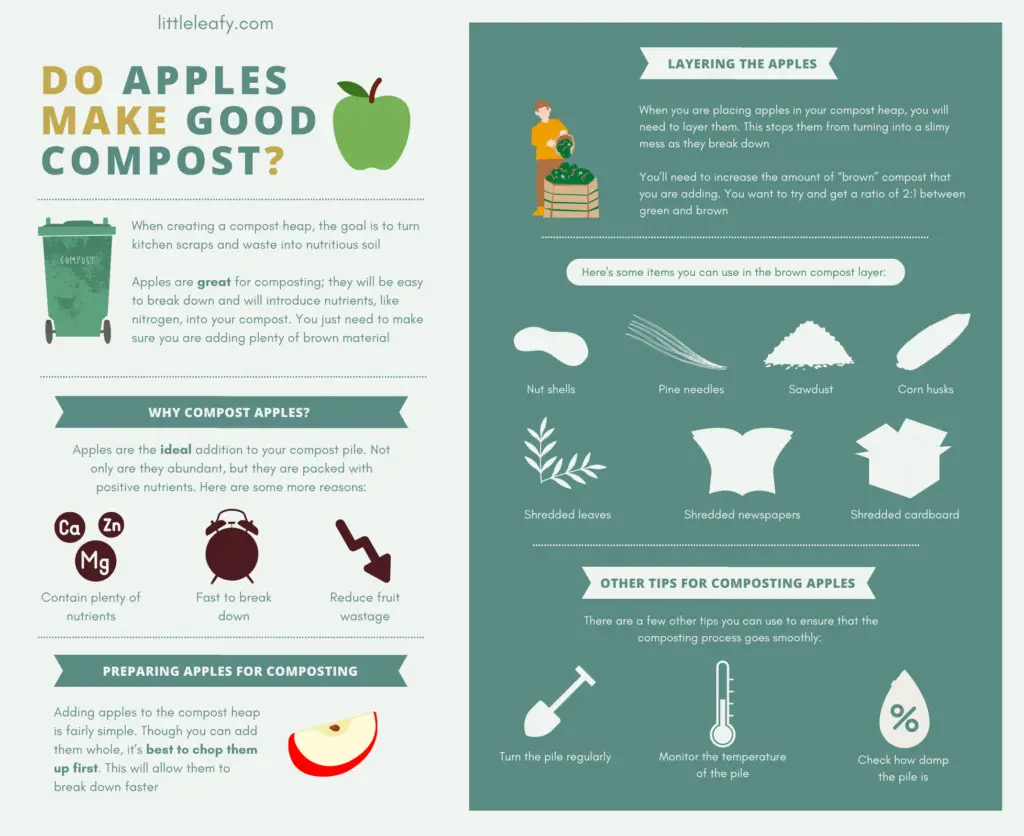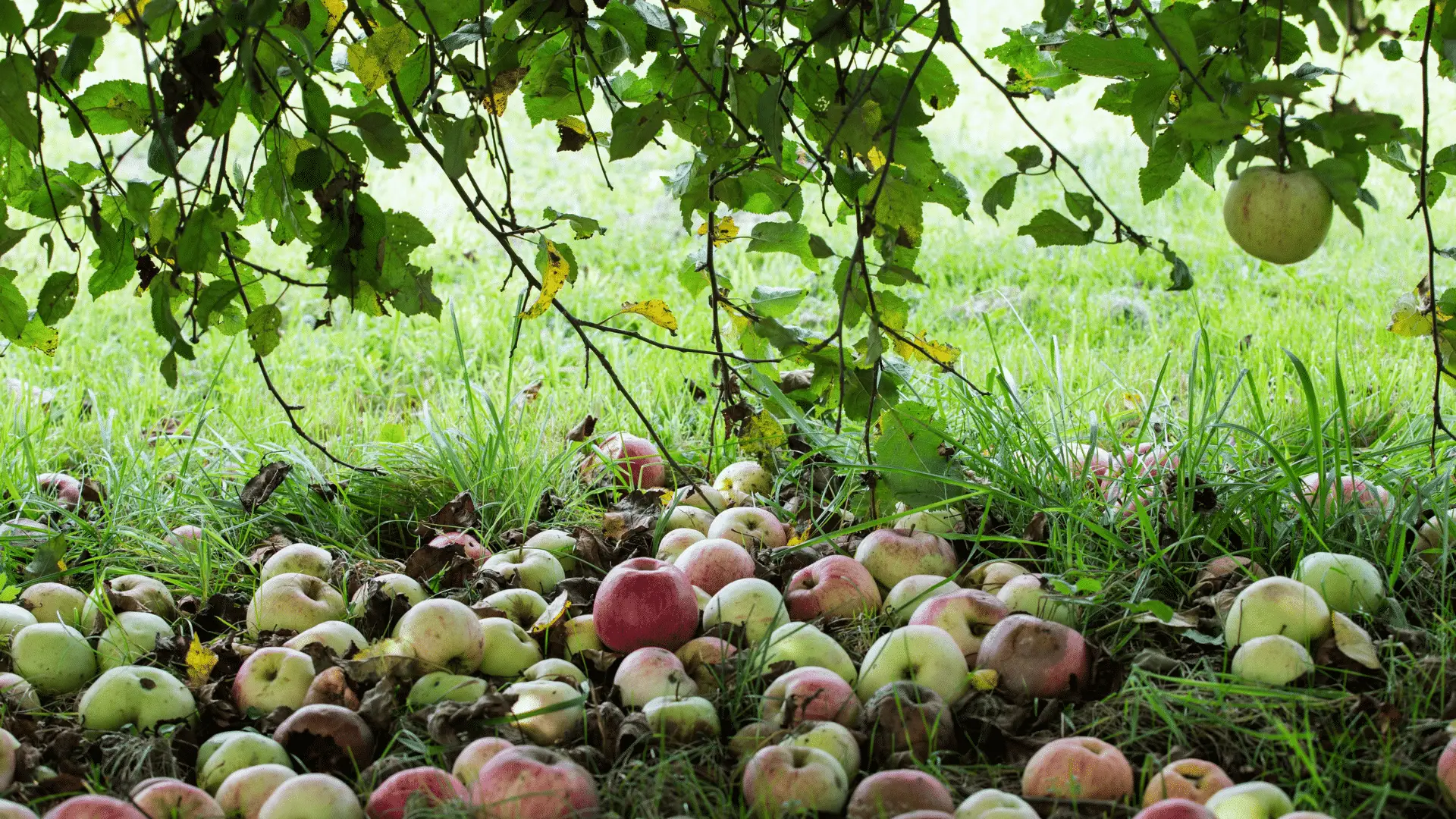Reading Time: 5 minutes 🍃
When creating a compost heap, the goal is to turn kitchen scraps and other waste into nutritious soil for your garden. But you need to be careful about what you are composting. You don’t want to accidentally add something that could negatively impact your health.
So, will you be able to compost apples?
Apples are great for composting; they will be fairly easy to break down and introduce nutrients, like nitrogen, into the compost heap. You just need to make sure you are adding plenty of brown material. This stops the nitrogen level from getting too high and will keep pests like fruit flies away.
Apples are a great choice for adding to your compost pile. Being an organic material, they will break down fairly quickly. Then, these nutrients can be added to the surrounding dirt. Keep reading to learn a few tips you should keep in mind when composting apples.

Why Compost Apples?
Apples are the ideal addition to your compost pile. Not only are they abundant, but they are packed with positive nutrients. Here are some of the reasons why you should consider putting apples on your compost heap:
- Contain plenty of nutrients. Apples have plenty of valuable nutrients which can be broken down and transferred into the compost pile. They are especially high in nitrogen, which is vital for plant growth. Plus, fruit seeds can be a good source of nutrients like phosphorus.
- Fast to break down. Many of us are familiar with how quickly an apple can turn bad. It will go brown within a few days. Because of this, it won’t take long for them to be turned into compost.
- Reduce fruit wastage. If you have an apple tree, you know how much fruit it will produce. Often, it will be more than you can eat or sell. By adding excess to the compost heap, you will be able to stop the nutrients to go to waste.
The only negative aspects that can come from composting are attracting fruit flies and other pests. But, as we’ll discuss later, there are lots of ways that you can deal with this.
How Do Apples Affect the Compost?
Before you start composting apples, it’s a good idea to have some idea of the impact they are having. Like other organic components, apples will be termed “green” elements. These are responsible for determining the amount of nitrogen that will be in the soil.
Nitrogen is an important element that plants need to survive. However, you don’t want to let the nitrogen levels get too high within the compost heap. This can hurt plant growth. Sometimes, it can leave them stunted or cause discolored leaves. If you are growing food, it can mean that vegetation grows strongly, but you get a lower yield.
You should keep these risks in mind when thinking about the number of apples you are adding. Usually, it’s a good idea to try and get a 50:50 ratio between nitrogen and carbon. You can get tests from hardware stores to help you measure this and decide if you need to temporarily cut back on the number of apples you are adding.
It can help to have a covered bucket or barrel for green organic matter. This will give you a place to store everything, rather than putting it all on the compost pile at once.
Preparing Apples for Composting


Adding apples to the compost heap is fairly simple. Though you can add them whole, it’s best to chop them up first. This will allow them to break down faster. Let’s look at some of the other tips that you can use when composting apples.
Layering the Apples
When you are placing apples in your compost heap, you will need to layer them. This stops them from turning into a slimy mess as they break down. Plus, it allows you to spread out the nutrients.
You’ll need to increase the amount of “brown” compost that you are adding. You want to try and get a ratio of 2:1 between green and brown. Here are some of the items you can use in the brown compost layer:
- Shredded leaves
- Shredded newspapers
- Sawdust
- Corn husks
- Pine needles
- Nut shells
- Shredded cardboard
Remember, you can always store green compost in a lidded bin if you don’t have enough brown compost to mix in with it.
Stopping Fruit Flies
One of the biggest issues that you will encounter is pests. Fruit flies and ants will be attracted to rotting apples. You might also have problems with birds. Thankfully, this is a fairly easy issue to solve.
You will need to layer the apples in. Cover them with brown compost. This does two things. First, it makes it harder for the fruit flies to get at the apples. Plus, the extra heat will make the fruit break down faster.
It can also be a good idea to put chicken wire at the base of the compost heap. This will stop larger animals, like mice, from digging into the heap and turning it into their new home.
Other Tips For Composting Apples
There are a few other tips you can use to ensure that the composting process goes smoothly:
- Turn the pile regularly. This has two purposes. First, it spreads out the nutrients. Secondly, it allows you to take decomposing apples deeper into the middle of the pile. The heat will break them down faster.
- Monitor the temperature of the pile. Ideally, it should be 160 to 170 degrees Fahrenheit. At this temperature, you won’t need to worry about weeds growing in your compost.
- Check how damp the pile is. You don’t want a compost pile that is a soggy mess. But you don’t want a pile that is too dry, as the worms won’t like this environment. Instead, you should aim for a pile that is moist to the touch.
As long as you keep these tenants in mind, you shouldn’t have any problems with turning old apples into usable soil.
Should You Add Rotting Apples
You don’t want to accidentally introduce disease and bacteria to the compost pile. This will depend on the type of rot the apple is experiencing. In most cases, you won’t have any problems. Mold or bacteria breaking down the apple is a normal reaction.
Once you put it into the compost heap, the heat will kill off the bacteria. You’ll just be left with the positive nutrients from the apple. It’s still a good idea to wear gloves when you are handling this material. Until it is broken down, the bacteria has the potential to make you sick.
However, there are some times when it pays to be a little more careful about what you are adding to the compost heap. These are apples that have diseases. This includes things like brown rot, which starts as a small dot at the base of the apple but quickly spreads.
If you add this to the compost pile, there is a chance that it will spread. It’s not worth taking the risk, so you’ll need to find another way to dispose of these apples.
Final Thoughts
In most cases, you will be able to compost apples without experiencing any problems. There are just a handful of guidelines that you need to keep in mind. Create a balanced mix between old apples and brown compost, like leaves and shells. Plus, you should check the apples for signs of disease before putting them into the heap. As long as you do this, you shouldn’t have any problems.
Sources
- https://homeguides.sfgate.com/compost-apples-37349.html

- https://www.gardenguides.com/84890-compost-5-gallon-bucket.html

- https://www.gardenersworld.com/how-to/maintain-the-garden/how-to-make-compost/

- https://www.the-compost-gardener.com/-diseased-apples-scab-in-compost-bin-.html

- https://www.thompson-morgan.com/diseases/brown-rot


